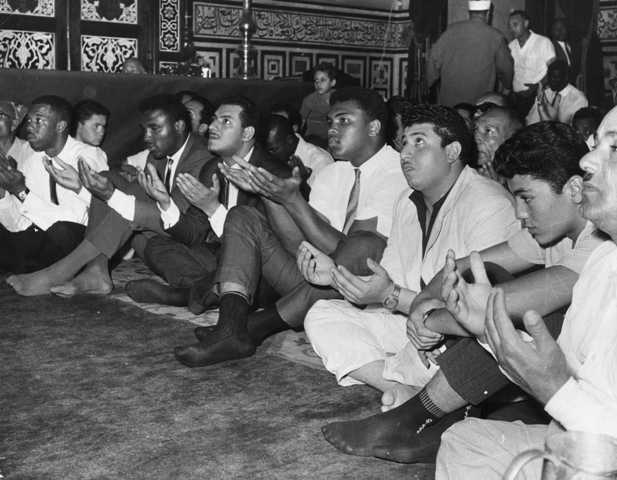'The Trials Of Muhammad Ali' Sets Boxing Aside To Look At Ali The Man
By Chuck Sudo in Arts & Entertainment on Nov 8, 2013 11:10PM

Muhammad Ali prays at the Hussein Mosque in Cairo in June 1964, four months after changing his name from Cassius Clay and announcing he is a member of the Nation of Islam. (Photo Credit: Express/Archive Photos/Getty Images)
The Trials of Muhammad Ali, Bill Siegel’s new documentary about the legendary boxer’s political and social awakening and his conscientious objection to the Vietnam War that cost him his prime physical years as a pugilist, begins with a sharp jab worthy of The Greatest himself. Ali is seen via satellite on a television program discussing why he won’t be drafted when normally mild-mannered, even-keeled talk show host David Susskind drops all semblances of journalistic pretense and tears into Ali.
“He’s a disgrace to his country, his race and what he laughingly describes as his profession,” Susskind says. “He’s a simplistic fool and a pawn.”
That scene immediately cuts to 2005, where Ali is awarded the Presidential Medal of Freedom—the nation’s highest civilian award—by President George W. Bush who calls Ali both “a fierce fighter and a man of peace.” The juxtaposition of the two scenes could not be more jarring and highlights the fight Ali faced outside the ring in the 1960s to be respected for his religious and political views and the establishment who sought at every turn to discredit him as a brainwashed lackey of the Nation of Islam.
Muhammad Ali has long been a popular subject for documentarians and filmmakers yet nearly all of the films to come before Trials fail to dig deep into his religious conversion and the four-year legal battle that found Ali resorting to acting gigs and speaking engagements to support his new wife Khalilah and their children—gigs often fraught with tension and a hint of menace as Ali spoke before initially hostile audiences.
Siegel ignores Ali’s boxing career and instead uses the first fight with Sonny Liston as the background to Ali’s initial flirtation with the Nation of Islam. This decision breathes new life into the Ali narrative and ropes the viewer in immediately for a brisk-paced, 94-minute thrill ride. Shunting Ali’s boxing exploits to the background allows Siegel to use archival footage not seen in nearly a half century, classic photography (including some by nonagenarian Chicagoisto Art Shay) and first-person accounts from the people who had the best views of Cassius Clay as he changed his name and went from being the egotistical “Louisville Lip” to the planet’s most visible advocate for a religion—Islam—that is as misunderstood and disrespected today as it was when Ali converted 49 years ago.
Khalilah Camacho-Ali comes across in the film as Ali’s intellectual equal and in her early scenes establishes herself as one who isn’t impressed by the newly crowned heavyweight champion. Born into the Nation of Islam, Camacho-Ali speaks passionately for her ex-husband as she recalls their initial courtship, how Ali began to show humility as his religious beliefs became more devout and the arguments the couple had when he wanted to throw in the towel and end the speaking engagements.
Camacho-Ali’s institutional familiarity with the Nation of Islam’s hierarchy helped Siegel lock down the coup of the film: an interview with Nation of Islam leader Louis Farrakhan. Farrakhan is mesmerizing when he’s on screen, a combination of benevolent elder statesman and pit bull ready to lock his jaws onto the first loose limb he can find and hold on for dear life. Farrakhan, for the first time on film, lovingly reminisces about Ali and his days in the Nation.
Of course, Ali’s evolution didn’t end after he won his battle to remain a free man. His religious beliefs eventually veered away from the nationalist, separatist leanings of Farrakhan and the Nation into a more traditional form of Islam, while Siegel glances over Ali’s continuing battle with Parkinson’s disease—a byproduct of his boxing career.
Last month I met author Barry Gifford over dinner who said, when I told him of the film and my reaction, “Muhammad Ali is the greatest political figure of my lifetime.” The Trials of Muhammad Ali makes a great case in Gifford’s favor.
The Trials of Muhammad Ali is playing in theaters across the country; check the film's website for cities and showtimes. The film will screen in Chicago from Nov. 8 through Nov. 14 at the Music Box Theatre (3733 N. Southport Ave.), Chatham 14 Cinema (210 W. 87th St.) and ICE Lawndale 10 (3330 W. Roosevelt Rd.). Bill Siegel and Khlalilah Camacho-Ali will discuss the film at the Music Box 8 p.m. Nov. 8.; (tickets are available here), 4:45 p.m. Nov. 9 at Chatham 14 and 7 p.m. Nov. 10 at ICE Lawndale 10. The Music Box will also host a special screening 7:15 p.m. Nov. 13 with an appearance by the group Athletes United for Peace.